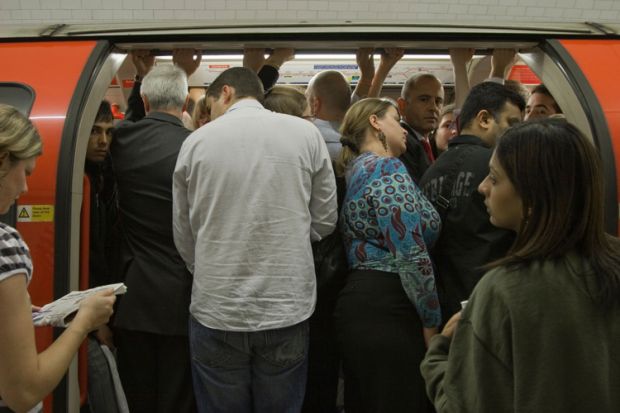Take part in the Times Higher Education Best University Workplace Survey 2016
University staff working outside London are happier about their work and their employers than their capital-based counterparts, figures from Times Higher Education’s survey of the sector’s workforce shows.
Previously unreleased results from the Best University Workplace Survey 2015 – released to coincide with the launch of the 2016 poll – reveal that employees at London universities have significantly lower job satisfaction scores than those located in almost every other region.
When asked if they would recommend working at their university to others, just 42 per cent of staff at London universities say they would and 40 per cent say they would not; the remainder were undecided.
In contrast, 74 per cent of those in northeast England would recommend their university to others, while only 15 per cent would not.
Higher education staff in other regions also report high levels of happiness with their institution: 70 per cent of university employees in the East Midlands, the West Midlands and Yorkshire and Humberside speak positively of their institution.
Quizzed on whether they gain satisfaction from their work, staff at London universities are less happy than those elsewhere. Of the capital’s survey respondents, 73 per cent agree with the proposition.
In contrast, job satisfaction scores in eight of the 11 other regions exceed 80 per cent, with Yorkshire and Humberside (84 per cent) and the East Midlands (84 per cent) topping the chart.
Ed Byrne, president and principal of King’s College London, said that the results may reflect the fact that although London is “one of the major international cities for university life”, it is “unusual in that universities are a fairly small part of the ecosystem in what is arguably the world’s greatest city today”.
This has “huge advantages” for academia generally, but there are potential disadvantages for individuals as London’s campuses are “largely city universities in and part of London, which makes a sense of community more difficult at times”, Professor Byrne said.
The “social and financial pressures of living in a world city may be greater than elsewhere”, he added.
Andrew Oswald, professor of economics at the University of Warwick and an expert on happiness and the assessment of life satisfaction, agreed that London’s high cost of living and long commutes help to explain the results, which are based on answers from more than 4,150 staff at 140 institutions.
But lower satisfaction levels in London could not be blamed solely on living costs because staff in the relatively high-cost South East of England reported much higher happiness levels, Professor Oswald said.
Academics in London are more likely to make “deleterious” comparisons with better-paid friends and affluent neighbours, which increase their discontent, he said.
“There are an awful lot of millionaires in London, and as a very dense city, it’s hard to avoid the silver Range Rovers,” he said.
Academics in London are also more likely to be the lower earner in their own household if their partner is a well-paid City professional, which can lead to “invidious comparisons”, he added.
Benjamin Poore, a teaching fellow at Queen Mary University of London’s School of English and Drama, believes that the results reflect the lower levels of job security “peculiar” to London universities.
“There are many large institutions that are often on the lookout for hourly paid and sessional teaching, which can afford individuals excellent opportunities and experience,” said Dr Poore, who added that many of his friends and colleagues work across more than one institution.
However, he said, “being hourly paid or fractional staff too often means existing on the fringes of an institution, with no office space or indeed web page to speak of”.
“It is very easy to feel ‘on the outside’ as an early career researcher or hourly paid lecturer in London, buffeted from one short-term, part-time contract to the next,” he added.
Keith Simpson, president of the University and College Union branch at City University London, described the capital as a great place to work as an academic but noted that its “sheer expense” affects job satisfaction.
“Junior academics have little chance of getting on the property ladder, are forced to rent in the expensive private sector and face the daily grind of a long commute to and from work,” he said. “It is little wonder that working in London may not quite live up to what it should be”.
| I would recommend working at my university to others | Agree % |
| North East | 74.2 |
| East Midlands | 70.3 |
| Yorkshire and Humberside | 70.0 |
| West Midlands | 69.7 |
| South East (not London) | 68.3 |
| North West | 62.5 |
| Scotland | 56.4 |
| Wales | 51.2 |
| South West | 50.3 |
| East of England | 50.0 |
| London | 42.0 |
Note: Results from Northern Ireland not included due to small sample size.
Source: Times Higher Education’s Best University Workplace Survey 2015
POSTSCRIPT:
Print headline: London has the UK’s least happy workforce
Register to continue
Why register?
- Registration is free and only takes a moment
- Once registered, you can read 3 articles a month
- Sign up for our newsletter
Subscribe
Or subscribe for unlimited access to:
- Unlimited access to news, views, insights & reviews
- Digital editions
- Digital access to THE’s university and college rankings analysis
Already registered or a current subscriber? Login




